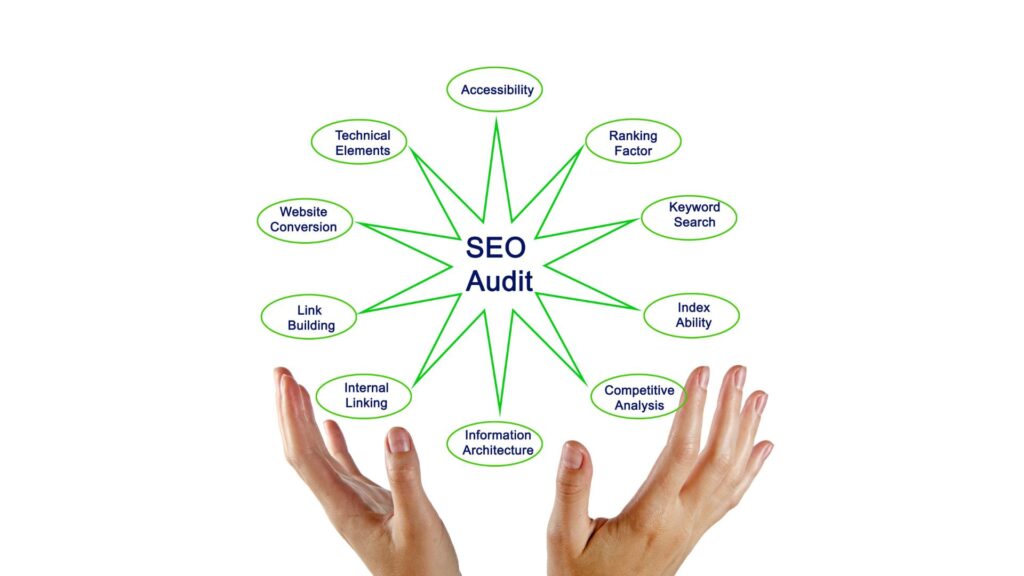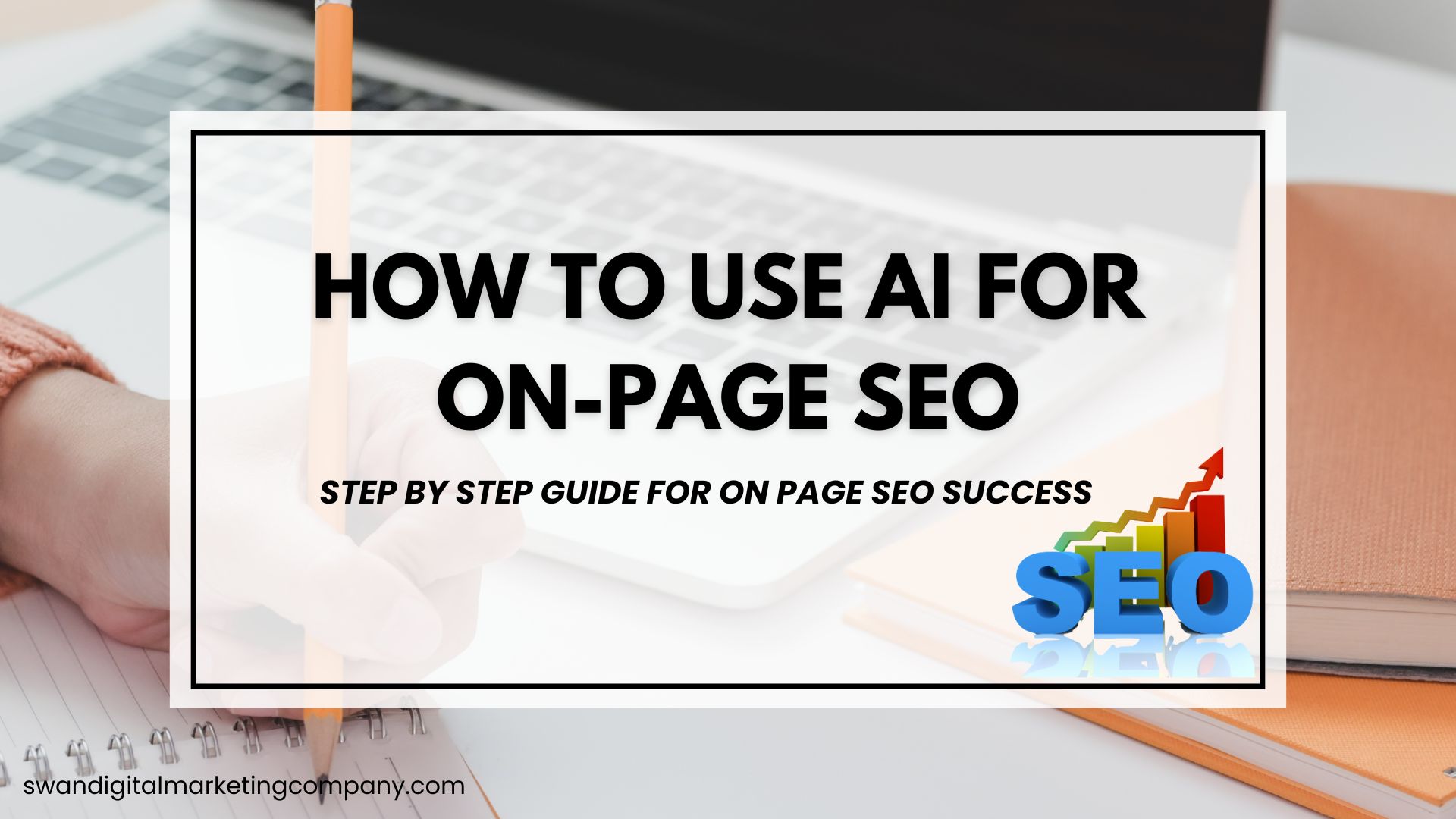Did you ever notice a sudden drop in your website traffic despite applying all SEO strategies. Being an adaptable content marketer, use the concept of how to use AI for on page SEO strategies. When you properly know the use of AI for SEO optimization, within months your website not only regains momentum but surpasses previous traffic records.
In 2025, marketers are using AI for on-page SEO to get higher website prominence on search engines. AI’s ability to analyze vast amounts of data and predict user behavior makes it an invaluable tool for on-page SEO.
- On-Page SEO: This involves optimizing individual web pages to rank higher and earn more relevant traffic in search engines. Key elements include content quality, keyword usage, meta tags, and internal linking.
- Off-Page SEO: This focuses on external factors, primarily backlinks from other websites, social media signals, and online reputation, which influence a site’s authority and ranking.
How AI Improves On-Page SEO Ranking
AI streamlines the SEO process by automating tasks that were once manual and time-consuming. For instance, AI can analyze user intent, optimize content, and even predict future trends. A study revealed that 86% of SEO professionals have integrated AI into their strategies, highlighting its growing importance.
Using AI, websites can deliver personalized content, better user engagement, and reduce bounce rates. AI tools analyze user behavior to suggest content improvements, ensuring visitors find what they’re looking for quickly and efficiently.
The Basics of On-Page SEO and AI Integration
Here are the key On-Page SEO factors every website should optimize.
- Ensure content is informative, engaging, and relevant to the target audience.
- Use relevant keywords naturally within the content.
- Craft compelling meta titles and descriptions to improve click-through rates.
- Link related content to guide users and distribute page authority.
- Ensure the website is responsive and performs well on mobile devices.
AI excels at processing large datasets to uncover insights that inform SEO strategies. AI helps decipher what users are searching for, allowing for more targeted content creation. Automating repetitive tasks like keyword tracking and performance reporting saves time and reduces errors.
Best AI Tools for On-Page SEO
- Semrush: Comprehensive SEO tool for keyword research, competitor analysis, and site audits.
- Frase, Inc.: AI-powered content optimization tool that helps improve SEO relevance.
- Jasper AI, Inc. – AI writing assistant that creates high-quality, SEO-friendly content.
- Surfer SEO – SEO optimization tool that analyzes top-ranking pages and provides content recommendations.
- MarketMuse – AI-driven content planning tool that identifies ranking opportunities.
- Outranking – AI-based tool that helps create data-driven, high-ranking content.
- ChatGPT – AI chatbot for generating SEO-friendly content, ideas, and meta descriptions.
- RankIQ – AI-driven keyword research tool designed for bloggers and content creators.
- Check SEO Ranking – Tool to monitor search engine rankings for keywords and pages.
- Competitor Keywords – Helps analyze competitors’ keyword strategies for SEO improvement.
- Diib – AI tool for tracking website health, SEO issues, and ranking improvements.
- Scalenut – AI-powered content writing and research platform for SEO optimization.
- Ahrefs – SEO tool for backlink analysis, keyword research, and website audits.
- AI Outline Generator – Tool for automatically generating SEO-optimized content outlines.
- Ink – AI-powered writing assistant for content creation and SEO optimization.
- NeuronWriter – AI-driven content writing and optimization tool based on NLP analysis.
- WordLift – AI-based tool for adding structured data (schema markup) to web pages.
- AI Writing Assistant – General term for tools that help generate and optimize content.
- Content Optimization – Enhances content readability, keyword placement, and SEO performance.
- Keyword Insights – AI tool that provides keyword clustering and intent analysis.
- LinkWhisper – AI-powered internal linking tool that suggests relevant link placements.
Step-by-Step Guide to Use AI to Optimize Your On-Page SEO
AI simplifies complex tasks, saves time, and improves search rankings. Below is a detailed, step-by-step guide on how to use AI for better on-page SEO.

1. AI-Based Keyword Research for On-Page SEO
Finding the right keywords is the foundation of on-page SEO. AI tools like ChatGPT with right prompts, Semrush, Ahrefs, and Surfer SEO analyze vast amounts of data to identify high-ranking, low-competition keywords. Look for AI tools that provide search intent analysis to align your content with what users need. Here’s how AI makes keyword research easier:
- AI forecasts search trends based on real-time data.
- NLP-powered tools analyze search behavior to suggest keywords that match what users are actually looking for.
- AI groups related keywords so you can create topic-focused content that ranks better.
2. AI for Content Writing
AI tools write content faster than human writers. Tools like ChatGPT, Perplexity, Frase, and Jasper help create high-quality, SEO-friendly content. But you need to use your writing style and information to add quality in the content. They analyze top-ranking pages and suggest:
- Optimal keyword placement in headings, paragraphs, and meta tags.
- Content structure improvements for readability and engagement.
- Related questions and FAQs to cover user intent comprehensively.
AI doesn’t replace human creativity, but it ensures your content is structured for search engines and valuable for readers.
3. Writing Meta Description With AI
Meta descriptions help search engines and users understand your content. AI tools generate compelling, keyword-rich meta descriptions that:
- Improve click-through rates (CTR) by making search results more engaging.
- Match search intent by summarizing the content effectively.
- Stay within the ideal character limit (150-160 characters) to avoid truncation.
Use this prompt for meta description:
“I’ve written an in-depth article about (write topic name). Generate a meta description with the target keyword (add your keyword). Follow all the SEO best practices when writing the meta description.”
“Give me 3 more variations for the above meta description following all SEO best practices.”
4. Internal Linking Optimization in SEO
Internal links help distribute link equity and improve website navigation. AI tools like Link Whisper and Surfer SEO analyze content and suggest the best places to insert links. Always check AI-generated links manually to ensure they add value and context.
AI improves internal linking by:
- Finding orphan pages (pages with no internal links).
- Suggesting relevant anchor texts to enhance user experience.
- Ensuring link distribution for better site structure.
5. Automating Schema Markup Implementation
Schema markup helps search engines understand your content better. AI tools like Schema Markup Generator and RankRanger automate this process. AI can generate schema for local businesses, articles, products, and events to boost visibility.
With AI, you can:
- Add structured data without manual coding.
- Optimize for rich snippets like FAQs, reviews, and product details.
- Improve click-through rates by making your content stand out in search results.
6. Improve Website Speed and Core Web Vitals
Site speed and user experience impact SEO rankings. Google prioritizes fast-loading, mobile-friendly sites, so AI-based optimization is essential. AI-driven tools like Google PageSpeed Insights and NitroPack help optimize:
- Image compression without losing quality.
- Lazy loading to improve page load speed.
- Code minification to remove unnecessary elements and enhance performance.
7. Analyze Search Intent for SEO
AI helps understand why users search for specific queries. Understanding search intent allows you to create content that meets user needs, increasing engagement and conversions. Tools analyze search results to categorize intent into:
- Informational: “What is on-page SEO?”
- Navigational: “Best AI tools for SEO”
- Transactional: “Buy AI-powered SEO software”
8. AI-Driven Content Updates for On-Page SEO
SEO is not a one-time task—content needs regular updates to stay relevant. Use AI insights to update content every 6-12 months for consistent SEO gains. AI tools like Surfer SEO and Content Harmony analyze old content and suggest:
- Keyword refreshes to align with current trends.
- Content length adjustments based on top-ranking competitors.
- Better readability and engagement enhancements for improved rankings.
AI analyzes user behavior and search intent to optimize internal linking, URL structures, and site hierarchy, improving crawlability and user navigation. It enhances user experience and reduces bounce rate.
Real-World Applications of AI in On-Page SEO
- E-commerce platforms leverage AI for automated product descriptions, personalized search results, and dynamic content optimization to enhance rankings.
- AI-driven tools like SurferSEO and Clearscope analyze top-ranking content and provide data-driven recommendations for blog optimization.
- AI helps news websites by summarizing content, auto-generating headlines, and ensuring fresh, SEO-friendly updates in real time.
- AI tools detect outdated information and suggest keyword updates, internal links, and fresh data to keep content relevant for search engines.
Conclusion
Although AI tools automate tasks, it is always best to add creativity and authentic information in your content that really help users. AI content also have a risk of content duplication ignoring human creativity. It can negatively impact SEO when AI is misused.Think of AI as an assistant. It helps analyze trends, structure content, and suggest optimizations, but the creativity, authenticity, and personal touch must come from you. So combine AI with human expertise for strategic content creation, ethical AI use, and compliance with search engine guidelines.
If you want to increase your website’s traffic, I’m here to help. We at swan digital marketing company, optimize your site for sustainable growth and higher rankings. Get in touch today or email me at [email protected] for an instant response, discuss your needs, and get a free consultation.
